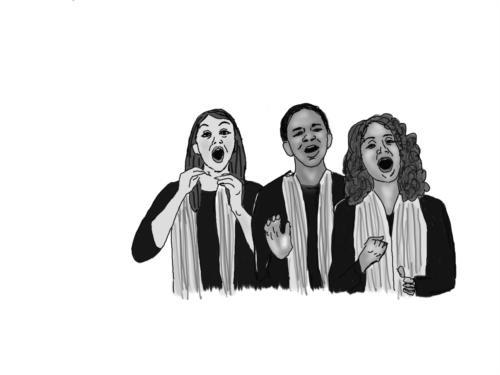
News
Cambridge Residents Slam Council Proposal to Delay Bike Lane Construction

News
‘Gender-Affirming Slay Fest’: Harvard College QSA Hosts Annual Queer Prom

News
‘Not Being Nerds’: Harvard Students Dance to Tinashe at Yardfest

News
Wrongful Death Trial Against CAMHS Employee Over 2015 Student Suicide To Begin Tuesday

News
Cornel West, Harvard Affiliates Call for University to Divest from ‘Israeli Apartheid’ at Rally
‘Holding On’ Through Harvard

When times were hard, when I was drowning in a sea of work and responsibility, when I didn’t think I was going to make it to graduation, I found myself singing “Hold On,” the old Negro spiritual that goes: “Hold on, just a little while longer / Hold on, just a little while longer / Hold on, just a little while longer / Everything will be alright / Everything will be alright.”
It may seem strange that a white boy from the suburbs of Los Angeles would find strength in a song that was born out of the African Diaspora. My ancestors did not come to America on slave ships. They were not threatened, lynched, or discriminated against because of the color of their skin. They did not sing Negro spirituals.
My white European ancestors came to America of their own free will to find a better life and to escape the petty oppressions of the Old Country. Thanks to their gamble, I’ve enjoyed many privileges in my life, and I’ve never encountered the kind of adversity that inspires a song like “Hold On.”
Yet there is something about the song that speaks to me. It reminds me that I can accomplish things I didn’t think I could if I just hold on, pray on, fight on, and sing on a little while longer. And even though the context in which I sing the song differs from the context in which it was first sung, the message of hope for the future remains the same.
I learned “Hold On” shortly after I arrived at Harvard at a Kuumba Singers rehearsal during the fall of my freshman year. I didn’t know then that I would need that song to get through late nights in the library, to get through difficult classes, to get through painful arguments with friends, to get through long stretches of time without seeing my family, to get through four years here.
Kuumba is not a “gospel choir,” as anyone who has spent time in the group knows, but a choir that celebrates the creativity and spirituality of black culture. Beyond semantics, it is a place where blacks, whites, Asians, and Latinos can do something very simple: come together and sing about hope in a supportive environment.
Harvard is not an entirely welcoming or friendly place, neither for minorities nor for the rest of us. Along with the academic and social pressures that come with being a student here, there is the additional pressure of presenting a certain façade. In Kuumba, we didn’t have to pretend to be perfect or unburdened. We sang out our frustrations and stresses, and we asked for emotional and spiritual support in closing circle at the end of every rehearsal. By singing and praying together, we tried to heal each other and ourselves.
As recent events prove, Harvard desperately needs an organization like Kuumba. I’d like to think that if everyone spent a semester in the choir, things like the “Quad incident,” in which the police were inappropriately summoned to a Black Men’s Forum and Association of Black Harvard Women event a few weeks ago, wouldn’t happen. Being in Kuumba means confronting our differences. And despite these differences, we always manage to find common ground in the music we sing.
Of songs like “Hold On,” W.E.B. DuBois, Class of 1890, wrote: “Through all the sorrow of the Sorrow Songs there breathes a hope—a faith in the ultimate justice of things. The minor cadences of despair change often to triumph and calm confidence. Sometimes it is faith in life, sometimes a faith in death, sometimes assurance of boundless justice in some fair world beyond. But whichever it is, the meaning is always clear: that sometime, somewhere, men will judge men by their souls and not by their skin. Is such a hope justified? Do the Sorrow Songs sing true?”
They certainly sing true for me, even if they weren’t written for or by me. Kuumba alumni sang “Hold On” when they were in the choir, and future members will sing it, too. I hope they find as much strength in it as I do.
So what kept us moving through those long days when our tasks required more than we could imagine giving? How did we hold on these last several years? We did it by singing together, by praying together, by fighting together, by holding on together.
We will continue to do so.
Andrew C. Esensten ’07, a former Crimson columnist, is a literature and African American studies concentrator in Adams House. He was vice president of the Kuumba Singers in 2005-2006.
Want to keep up with breaking news? Subscribe to our email newsletter.
